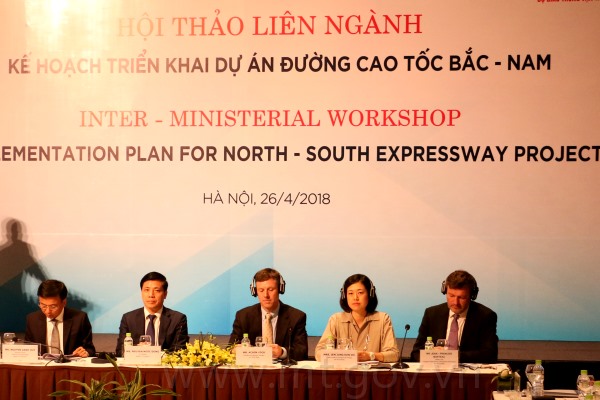 Society
Society

Focusing on legislation and involvement of the public and private sectors are a driving force for attracting investment in transport projects, including the North-South Expressway project, said Transport Deputy Minister Nguyễn Ngọc Đông at a workshop on April 26.
 |
| Focusing on legislation and involvement of the public and private sectors are a driving force for attracting investment in transport projects, including the North-South Expressway project. — Photo mt.gov.vn |
HÀ NỘI — Focusing on legislation and involvement of the public and private sectors are a driving force for attracting investment in transport projects, including the North-South Expressway project, said Transport Deputy Minister Nguyễn Ngọc Đông at a workshop wher World Bank experts and officials of related ministries discussed the implementation plan of the project.
Speaking at the workshop on April 26, Đông said that a key challenge in infrastructure development in Việt Nam is that the country’s public investment on infrastructure only meets 25 to 30 per cent of demand. The Vietnamese Government is now calling for the involvement of private companies in transport projects under public-private partnership.
The North-South Expressway project has faced many challenges relating to inefficient and unsynchronised legal frameworks, and difficulties related to long-term credit. In particular, the law on public-private partnership investment has yet to be enforced, he said.
Nguyễn Danh Huy, general director of the transport ministry’s Public Private Partnership Investment Project Management Department, said that there are currently about ten laws related to public-private partnership investment, but their content remains conflicted and overlapped.
Achim Fock, acting country director of the World Bank Việt Nam, said that investment in high-quality expressways is an area where Việt Nam lags behind. The length of high-quality expressways per 1000sq.km is 2km for Việt Nam, compared to around 8km in India, and 13km in China.
“The North-South Expressway will connect Việt Nam much better, and will create a more integrated economy," he said, "This will increase competitiveness, and ultimately the prosperity of the country and its people."
"Unlike traditional projects, the North-South Expressway requires the involvement of public-private sector cooperation, and commercial funding,” he said.
According to Ministry of Transport, the total investment needed for the North-South Expressway is US$5.3 billion. The State budget will allocate $2.42 billion, while the remaining $2.88 billion must be sourced from investors.
The revenue cannot come from the public sector alone, especially given concerns on overall public debt, Achim Fock said, highlighting the significance of the share between public sector and private investors.
He said that World Bank and other development partners can also bring experiences from elsewhere to help Việt Nam.
The planned North-South Expressway will cover 2,109km in total, and stretch from the northern province of Lạng Sơn to the southernmost province of Cà Mau.
According to research from domestic and international consultants, by 2020, the North-South corridor will serve 45.37 million passengers per year, and transport up to 62.27 million tonnes of cargo per year.
The Vietnamese National Assembly and Government issued resolutions to offer policies to facilitate the plan.
The Ministry of Science and Technology has submitted to the Government a draft law on public-private partnership investment. — VNS




